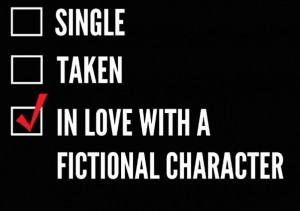aka the only series I ever review here anymore. That might change if I stop reading crap soon, but probably not. I like Goodreads for the books, but I love finding my old Gabriel Allon posts here. Tradition! is not just for Fiddler.
[bctt tweet=”My annual summer date with Gabriel Allon and @DanielSilvaBook #HereThereBeSpoilers #TheOrder” username=”travellingcari”]
Here there be memes. And spoilers. You can start this series anywhere, but I recommend the beginning so you can fall in love with Gabriel Allon as Silva rolls him out.
It’s now five years that I started reading this series as soon as the next book came out. I find it amazing I could wait until December before then! It’s funny to look back at all of the book signings here and in Facebook memories to see my haircuts of the last decade as I sit here in quarantime pigtails.
The Order is somehow the twentieth book in the Gabriel Allon series. I still remember reading my first, more than fourteen years ago. I was in Japan in pre eBook dates and desperate for anything English. Little did I know what I was in for with Daniel Silva’s words and characters. It’s funny to look back and see I reviewed Allon books here, BookCrossing. LibraryThing and Goodreads.
This book was a little Daniel Silva meets Dan Brown, and I mean that in a good way. I love Dan Brown’s Robert Langdon books, especially Angels and Demons. In fact, when Gabriel and Donati met Robert Jordan in Assisi, I had to double check Langdon’s last name as I haven’t read any Dan Brown recently. Yes, this book is set almost entirely in Italy and like his other books with Israel, this book really made me want to go to Italy. For the since cancelled trip to Spain to celebrate 40, it was down to Spain or Italy – neither would have been a bad choice. I have a feeling that when this trip is rescheduled, it might flip back to Italy. Mom has been a lot, I’ve only been once for a weekend to Rome and didn’t even make it into the Vatican since President George W. Bush was there. Ironic, considering one of the reasons I left Prague for the weekend was that his security was making things a challenge.
Back to the book…
I didn’t remember Carlo and Veronica Marchese, but I was very glad when I realized that Silva would again be exploring the Church’s role in the Holocaust through the lens of Gabriel’s relationship with Pope Lucchesi. In reading back, I see why I didn’t remember the Marcheses – the summer of bingeing Allon after walking away from the series for a bit and Fallen Angel was the last of the three I read. The Angels & Demons reference earlier likely gave it away, but Lucchesi didn’t survive to see this book and much like in Da Vinci Code, Gabriel and Donati are grappling with a secret order that is up to no good. In this case, the Order of St. Helena, their quest for the papacy, and the gospel of Pontius Pilate.
Although we saw Allon work with his team in a pivotal part of this story, this wasn’t an Office job. In fact, Gabriel was meant to be on vacation in Italy when the Pope died, throwing that vacation out. This wasn’t a bad thing, but it definitely led to a different feeling than a typical Silva book.
You know how they say mnemonics help you remember? I spent much of this book thinking about two lessons from Spanish class that still stick with me: el problema is masculine and la solución is feminine and la papa is a potato and el papa is the pope. If Allon and Donati hadn’t been successful in their task, there might have been something worse than a potato in the Vatican. Like other Allon books, Silva weaved in some current events — the pandemic and the rise of the right in Europe and the US. Both worked without feeling as if he were trying too hard.
This book was interesting in a number of ways:
- no Shamron, but lots of Chiara and the kids. This look at domestic Allon was fun, but I don’t like that he has only two more years in office and they’re planning for his post-Office life. I’m not ready for Allon (or Silva!) to hang it up. I love these characters too much. Although there was no Shamron, Gabriel literally visited the origins of the series as he went past the spot in Munich where the Israeli athletes were taken hostage.I keep trying to do the math to age Allon, and I’ve finally realized it will never work. I loved too that they revisited the spot where he met Chiara, and I was glad for that history of Jews in Italy.
- No “Snow falls on Vienna while the missiles rain on Tel Aviv.”. I guess because the book was in neither place, but it felt weird to not have that line.
- As someone whose knowledge of the foundations of Christianity is rough, to say the least, I appreciated how Silva used Donati and the letter to tell the story of Pilate.
- #FakeNews conspiracy bullshit drives me crazy, but I am here for Avalon, Holy Grail and all the historical quests. As myths they seem less crazy making
As always, I enjoy my time with Allon. Even when he’s not doing Office work. He was safer, his life wasn’t in particular danger, he didn’t break a bone..
Is it July 2021 yet?


I love the way you’ve stuck with this series all the way through – did you just read all you could find until it was time to get them on publication day?
I am almost done with the book! Love the series and Gabriel. I also thought it was very Dan Brown-ish good story and great characters
I almost tagged you in our (spoiler free https://twitter.com/travellingcari/status/1284253125449330688) twitter thread of book worm silliness as I thought I remembered you saying you read this. Next year I will for sure. I was so bummed he didn’t do a local virtual here or there. And yes, I agree, loved the characters.
I was disappointed. If you’re a regular reader of the Gabriel Allon series expecting the terrorist/espionage thriller that Silva is known for, this is not it. It’s closer to Dan Brown’s DaVinci Code. And Silva recently injecting his political views into his stories is becoming tedious.
Where is this book political? Silva is trying to educate his readers about the origins of antisemitism. The Gospel of Pilate may be a fictional creation, but the circumstances of its origins are not. It’s good for Christians to read that the Jews were not the killers of Christ. Hooray for Silva!
What political views are expressed here? Silva is using the story of Pontius Pilate to educate his readers on the origins of anti-semitism, and how the Catholic Church was responsible for the great lie. Anti-semitism is not a political matter, it is a fact of history.